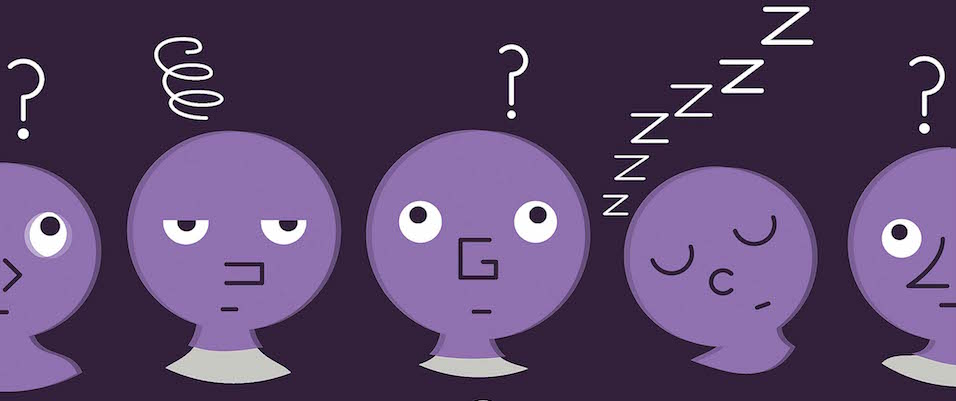It turns out that a sleepless night may cost you more than a morning of grogginess—it could be giving the proteins believed to cause dementia easier access to your brain.
Scientists at UC Berkeley’s Sleep and Neuroimaging Lab have discovered evidence that missing out on deep non-REM (rapid eye movement) sleep may leave the brain more vulnerable to the memory loss associated with Alzheimer’s disease.
Alzheimer’s disease, one of the most pervasive and debilitating forms of dementia, has been diagnosed in more than 40 million adults. As the massive Baby Boomer generation continues to gray over the next decade, this number will likely spike.

The study, published in Nature Neuroscience, found that beta-amyloid—a protein that has long been suspected of being a catalyst in Alzheimer’s—aggregates in higher concentrations in the brains of people who suffer from consistently poor sleep. As deposits of beta-amyloid grow, the protein further hampers one’s ability to sleep, which feeds into a miserable cycle that may lead to dementia.
UC Berkeley neuroscience professor Bryce Mander co-led the study with Alzheimer’s expert William Jagust, a professor at Berkeley with a joint appointment at Lawrence Berkeley National Lab. They and their colleagues were intrigued by recent animal research that suggested a reciprocal relationship between lack of sleep and the beta-amyloid pathology. Their cross-sectional study was designed to test whether the relationship between poor sleep and beta-amyloid aggregation had any actual bearing on memory loss.
“What was unknown was whether or not that’s just a side relationship that has nothing to do with the clinical symptoms of dementia, or if sleep disruption is part of why these toxic chemicals in the brain are causing memory loss,” Mander explains.
The researchers selected a group of 26 adults aged 65 to 81 who were not currently suffering from any form of dementia or sleep disorders. First, each subject underwent a positron emission tomography (PET) scan to measure the concentration of beta-amyloid in their brains. Within a year, they came back to the lab and memorized 120 word pairs. They then slept for eight hours while their brain waves were measured with EEGs. The next day, they were scanned with functional magnetic resonance imaging (fMRI) to measure their brain activity while they tried to recall the word pairs.
“This study builds on previous work suggesting that sleep is important for both consolidating new memories and for clearing potentially toxic proteins from the brain.”
The results from the scans revealed that individuals with the highest concentration of beta-amyloid in their brains experienced the worst sleep during the study and performed poorly on the word pair test. According to Mander, this indicated that beta-amyloid has a direct impact on memory by ruining the sleep required for building memories.
“This is not to say that amyloid and other pathologies can’t impact memory independent of sleep,” Mander says. “But it does suggest that part of the way it impacts memory is through sleep-dependent memory.”
Anyone who has ever racked up a nasty sleep deficit knows that it ruins your capacity to recall information. But there’s a good reason for this. During deep sleep—also known as slow wave sleep, when the brain is experiencing non-rapid eye movement—memory “traces” become reactivated, which triggers communication between the hippocampus and the cortex. The communication between these regions of the brain helps maintain the neuroplasticity that is required to “cement” long-term memories in the cortex, which can be retrieved hours or years later.
Past attempts to treat or reduce the build-up of beta-amyloid in the brain have failed to restore any meaningful cognitive abilities to people suffering from dementia. According to one theory, this protein eventually triggers a cascade of other events that lead to neuro-degeneration, so getting rid of the protein won’t simply “cure” the brain of other problems.
“You may reduce amyloids in those treatments, but you don’t treat the symptoms, and in some cases it continues to worsen,” Mander says. “It’s like cleaning the rubble after an earthquake hit—that doesn’t keep the earthquake from doing its damage.”

Mander believes that with this new understanding of beta-amyloid, researchers could start to harness it as a biomarker to assess which individuals are at a greater risk of developing Alzheimer’s. The good news is that beta-amyloid starts to build up in healthy adults well before the onset of symptoms of Alzheimer’s. So if it could be detected early through screening, it might be possible to delay the onset of more severe symptoms of dementia.
Researchers elsewhere were cautiously optimistic about the results. “This study builds on previous work suggesting that sleep is important for both consolidating new memories and for clearing potentially toxic proteins from the brain,” Douglas Galasko, a professor in the Department of Neurosciences at UC San Diego, who was not involved in the study, wrote in an email. “An intriguing possibility is that interventions to improve sleep may benefit pathways of amyloid formation. This deserves further study.”
Meanwhile, any practical advice for people who want to make sure they are achieving quality deep sleep? Although there may be some pharmacological remedy in the future, Mander cautions that trying to induce those Slow Waves in the brain with a sleeping pill would be tricky—and getting it wrong could possibly exacerbate memory problems. Experts advise that the easiest way is probably to exercise regularly. There is also an experimental technique known as transcranial direct-current stimulation, which exposes a person to a low-level current set at a frequency that matches the slow waves associated with deep sleep. And some potentially useful techniques rely on even stranger science.
“There’s even this one wacky method where you have people wear headphones and you play pink noise,” Mander says. “It’s not white noise, and it’s not this incidental event that will wake you up and startle you—it’s this specific pattern of acoustic sounds that are in time with the oscillations of your slow waves.”
Mander’s team recently received a grant from the National Institute on Aging so they can conduct a longitudinal study to see if the results from their first study stay true over time. Part of this study will be devoted to the cart/horse question: decisively figuring out whether beta-amyloid triggers sleep loss, or sleep loss causes beta-amyloid build up.
“That can give us a better sense of the causal chain of events,” Mander said. “And that will then be used to help inform us when we think about any future intervention studies where we try to enhance sleep.”





















